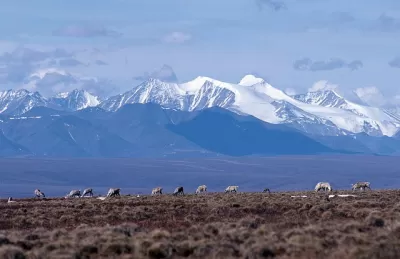When President Trump signs the tax-cutting bill, Sen. Lisa Murkowski (R-Alaska) will have achieved a family dream of opening up the pristine refuge, created 37 years ago, to drilling.

"The provision was added [to H.R. 1: Tax Cuts and Jobs Act] at the behest of Alaska’s senior senator, Lisa Murkowski, and, though it has nothing to do with tax policy and nearly had to be eliminated for parliamentary reasons, in the end it managed, stowaway-style, to cling to the legislation," reports Elizabeth Kolbert for The New Yorker on December 20, 2017.
H.R. 1 passed the Congress on Wednesday and was signed by President Trump on Friday, Dec. 22.
The 19.6-million-acre refuge Arctic National Wildlife Refuge (pronounced “an-war”) was created with the signing by President Jimmy Carter of the Alaska National Interest Lands Conservation Act on Dec. 2, 1980.
Development, including resource extraction, was prohibited in all but "1.5 million acres along the Arctic Ocean, east of Prudhoe Bay, known as the 10-02 area, were left in bureaucratic limbo, neither open to drilling nor off-limits to it," explains Kolbert.
The 10-02 may or may not contain a lot of oil—estimates range widely—but it is clearly the ecological heart of the refuge, the summer breeding ground for two hundred thousand caribou and millions of migratory birds.
Sen. Murkowski's "father, former Gov. and Sen. Frank Murkowski ... attempted to usher through the same legislation," reports Ashley Killough for CNN on Dec. 20. "The bill cleared both chambers of Congress in 1995, but it was vetoed by then-President Bill Clinton."
The tax bill offered Murkowski the opportunity to "take advantage of the 51-vote threshold opportunity, avoiding the 60-vote pitfall that has taken down ANWR in the past," adds Killough.
While the heated debate normally takes center stage in Washington around ANWR votes, the emotional clashing was somewhat overshadowed this time in part because it was attached to an arguably more controversial effort.
Will oil drilling proceed in ANWR?
"The tax package instructs the Interior Department to hold two lease sales in the next seven years," reports Dino Grandoni for The Washington Post on Dec. 21.
However, it is unlikely drilling would begin soon due to inevitable lawsuits and environmental reviews, report Ari Natter and Jennifer A. Dlouhy for Bloomberg News on Dec. 20.
"It’s still an open question about whether drilling will ever happen there," said Matt Lee-Ashley, a senior fellow at the Center for American Progress and former Interior Department official. "It’s hard to image that drilling will occur in the next 10 years -- or ever."
Murkowski also made the claim that revenues from oil drilling, which she estimated at $1 billion over ten years, would also help offset the tax cut. However, just how much oil is recoverable is questionable, reports Joel K. Bourne, Jr. for National Geographic on Dec. 19. And oil companies may not even be interested in drilling there, reports Justin Worland for TIME on Nov. 6.
FULL STORY: Will the Tax Bill Finally Defeat the Arctic National Wildlife Refuge?

Planetizen Federal Action Tracker
A weekly monitor of how Trump’s orders and actions are impacting planners and planning in America.

Map: Where Senate Republicans Want to Sell Your Public Lands
For public land advocates, the Senate Republicans’ proposal to sell millions of acres of public land in the West is “the biggest fight of their careers.”

Restaurant Patios Were a Pandemic Win — Why Were They so Hard to Keep?
Social distancing requirements and changes in travel patterns prompted cities to pilot new uses for street and sidewalk space. Then it got complicated.

Maui's Vacation Rental Debate Turns Ugly
Verbal attacks, misinformation campaigns and fistfights plague a high-stakes debate to convert thousands of vacation rentals into long-term housing.

San Francisco Suspends Traffic Calming Amidst Record Deaths
Citing “a challenging fiscal landscape,” the city will cease the program on the heels of 42 traffic deaths, including 24 pedestrians.

California Homeless Arrests, Citations Spike After Ruling
An investigation reveals that anti-homeless actions increased up to 500% after Grants Pass v. Johnson — even in cities claiming no policy change.
Urban Design for Planners 1: Software Tools
This six-course series explores essential urban design concepts using open source software and equips planners with the tools they need to participate fully in the urban design process.
Planning for Universal Design
Learn the tools for implementing Universal Design in planning regulations.
Heyer Gruel & Associates PA
JM Goldson LLC
Custer County Colorado
City of Camden Redevelopment Agency
City of Astoria
Transportation Research & Education Center (TREC) at Portland State University
Camden Redevelopment Agency
City of Claremont
Municipality of Princeton (NJ)





























